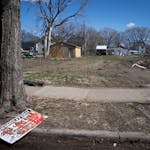Visitors to Maria Iwanok's home always left with something to eat.
"They couldn't escape," said her daughter, Anna Reuter. "They had to take something home with them, or she would not be happy."
A native of Ukraine who survived a World War II labor camp and eventually settled in Minneapolis, Iwanok is remembered as a woman of deep faith, generosity and grit. She took the bus alone into her 90s. She cooked delicious meals without a recipe or measuring cup. She had an abundance of friends, and made new ones wherever she went.
After a brief illness, Iwanok died Dec. 25 in Minneapolis. She was 100.
Maria Iwanok was born Aug. 11, 1919 in Ukraine to Andrij and Anna Vujko, the oldest of seven children. She had just a few years of education; she begged her parents to sell her portion of the family land and use the proceeds to send her to school, but attended for only a week before her mother insisted she come home.
As a young woman, Iwanok was forced into a Nazi labor camp in Germany and remained there for five years, followed by another five in a displaced persons camp. Decades passed before she could safely return to her village.
During her time in the labor camp, Iwanok met her husband, Mychajlo, a fellow Ukrainian who served in the Polish army and was captured by the Germans. In 1950, they immigrated to the United States with their son, landing in the Eastern European enclave of northeast Minneapolis.
"Almost every third or fourth house, you knew who lived there," Reuter said. "By the time you got home, your mother knew what you had done already."
Maria and Mychajlo both held blue-collar jobs, though he wasn't able to work much after losing an arm in a paper mill accident. Maria Iwanok was a dishwasher in a restaurant for a while, then started cleaning offices in downtown Minneapolis at night. Many of the women she worked with were Eastern European immigrants, too, and they would ride the bus home together at midnight when their shifts were over.
Though they never had much money, Reuter said, her parents routinely sent packages to family back home, filled with everything from new shoes to cocoa.
In 1965, Iwanok got word that her mother had died. Months later, Mychajlo died suddenly of a brain aneurysm. She never remarried, choosing to focus instead on her son and daughter.
"She taught me that if you have that faith in God, and prayer, you can get through anything," Reuter said. "She made it look like a piece of cake, but it wasn't."
Iwanok retired at 64 but didn't stop working. She was a pillar at St. Constantine Ukrainian Catholic Church, where she cleaned, decorated the altar, baked Communion bread and led pierogi-making to pay for the church building.
"When I was little, we called that church the church that pierogi built," said Bev Bachman, who grew up in Northeast and, with her husband, helps make the pierogi each week.
Iwanok was also a constant presence in her neighborhood, stopping to chat during her regular walks or coming by to share a cucumber from her garden.
Jean Borgerding lived four houses down from Iwanok for more than 30 years. A couple of years ago, one of her daughters visited and was barely home from the airport when Iwanok rang the doorbell, pierogi in hand.
"She was just a very generous, good-hearted, solid woman," Borgerding said.
Iwanok is survived by son Bob of New Hope, daughter Anna of Minneapolis, two grandchildren and six great-grandchildren. Services have been held.
Emma Nelson • 612-673-4509





